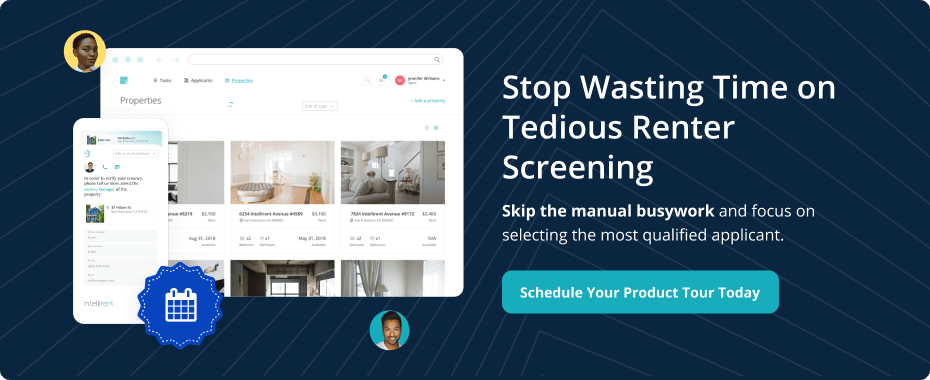April 20, 2023 • 7 min read
.jpg)
Are you tired of dealing with the headaches that come with pet-related property damage and disturbances?
As a property manager or leasing agent, you understand the importance of thoroughly screening tenants to ensure that they'll be good renters. However, when it comes to pets, you lack a robust screening tool to reliably assess how many and what types of pets and collect documentation like photos and vaccination records.
We've heard countless stories from owners who've had to deal with financial and emotional stress caused by unruly or destructive pets.
It’s a tricky business. On the one hand, you want to accommodate renters who have animal companions. On the other, you want to protect your property from damage and ensure it stays safe and healthy for all tenants. So, how do you strike the perfect balance?
With robust pet screening. Pet screening helps you collect the data you need to make informed decisions and prevent surprises or unexpected problems down the road.
Where do you start? Creating a complete pet screening process from scratch that is both reliable and helpful for property owners can feel daunting.
But it doesn't have to be!
This article will show you how to effectively and efficiently screen a tenant's pet without any extra work or headaches.
From understanding the ideal pet screening process to discovering tips, tools, and best practices, you'll gain the knowledge you need to keep your property and your tenants' animal friends safe and sound.
What is Pet Screening?
Pet screening is a process that leasing professionals use to determine how suitable a tenant's pet is for a rental property. The purpose is to assess potential risks associated with the pet, such as damage to the property, aggressive behavior, and disturbance to other tenants.
Pet screening usually involves gathering photos and information about the pet, including its breed, age, weight, and vaccination records, as well as any history of aggressive behavior. Property owners may also conduct reference checks with previous property owners or veterinarians and may require residents to provide proof of insurance coverage for the pet. Some property owners even require a pet interview or observation of the pet in person.
Pet screening tools like Intellirent can make the process easier and more reliable. You don’t have to go it alone!
Why Pet Screening is Important
Pet screening is essential because it facilitates transparency and trust, and helps leasing professionals identify potential risks associated with the pet to make fully informed decisions. It helps to ensure the safety and comfort of all tenants.
One of the main reasons pet screening is important is that it helps ensure that pets will not cause property damage or disturbances for other tenants. For example, pet screening can help identify aggressive or destructive behavior in pets, which can threaten other tenants. Property owners can reduce these risks by conducting a thorough pet screening process.
Another reason why pet screening is important is that it helps to ensure that the property is in compliance with any relevant laws or regulations related to pet ownership. For example, some localities may have restrictions on certain breeds of dogs or may require lessors to provide certain accommodations for service animals.
By conducting pet screening, lessors can make sure that they are adhering to all relevant laws and regulations and can avoid potential legal problems down the line.
Finally, pet screening is important because it helps owners set clear pet policies, including appropriate deposits that may be needed to cover any potential damages. This helps to protect the property owner's investment and to ensure that the tenant is fully responsible for any damages caused by their pet.
By setting clear policies and charging appropriate fees, leasing professionals can help to ensure that their rental property remains in good condition and is protected.
Understanding the Pet Screening Process
Pet screening involves requesting detailed information and documentation to verify the pet is safe to approve. A comprehensive pet screening process follows these steps:
- Determine and document your pet policy, such as size restrictions. You must have a plan for both pets and service or support animals (which are not considered pets)
- Communicate your pet policy to all prospective renters up front and ask if they own pets
- Collect information about all animals, including type, breed, weight, and age
- Collect necessary documentation, such as vaccination records
- Verify the pet's background by calling the previous lessor or veterinarian
- Schedule a pet interview to get a feel for the animal's temperament
- Review all provided information and determine whether the pet qualifies.
- Collect an additional pet deposit to reduce liability.
What to Look for in Pet Screening
When screening pets, it’s important to be on the lookout for red flags like a history of aggressive or annoying behavior, lack of records, or lack of proper vaccinations.
If your property has size requirements, be sure to verify the pet’s size with a photo or in-person visit.
Pet Screening Best Practices
When you’re screening prospective tenants’ pets, it’s essential to have and communicate clear guidelines and criteria. Transparency is the key here. Be sure to explain your pet policy and pet screening process and answer any questions.
Comply with all local and federal laws regarding pets and assistive animals. For example, some cities and states in the US have laws that prohibit lessors from denying tenants based on the breed of their dog, while others have laws that prohibit certain breeds altogether.
Assistive animals are protected by federal law under the Americans with Disabilities Act (ADA). The ADA requires lessors to make reasonable accommodations for individuals with disabilities, which includes allowing service animals in their rental properties, even if the property has a “no-pets” policy.
Service animals are defined as animals that are individually trained to perform tasks for people with disabilities. Lessors may not discriminate against tenants with service animals, charge extra fees or deposits, or treat them differently from other tenants. However, they can ask for proof that the animal is a service animal and ask what tasks the animal is trained to perform.
7 Tips for Streamlining Pet Screening
These pet screening tips can help save you time, money, and frustration.
- Collect a photo of the pet when conducting the application.
- Be prepared to answer questions regarding your pet policy and be open to any accommodations tenants may request.
- Include questions about the pet's behavior and obedience level.
- Make pet screening more efficient by using a standard application and questionnaire for all prospective tenants with pets. This will help ensure that all the necessary information is gathered in a consistent way.
- Have a clear plan in place to turn away rental applicants whose pets don’t meet your criteria.
- If your rental has a No Pet policy, have a plan of action for Assistive Animals.
- Use software like Intellirent to accelerate your pet screening process.
Pet Screening Checklist:
- Pet's breed, weight, and age
- Pet's photo
- Pet's vaccination records
- Pet's behavior history and obedience level
- Pet's reference check with the previous property owner or veterinarian
- Pet's insurance policy
- Tenant's agreement to follow pet policies
- Pet interview or observation of the pet
- Pet's rent and/or pet deposit
- Additional documents or certifications required by local laws or regulations
Top Pet Screening Services
There are various tools and services that are available to help with pet screening. Some offer pet screening as a standalone service, while others include it as an add-on to a broader service.
Leveraging technology to expedite your pet screening process can save you time, money, and liability. Pet screening tools can automate certain tasks like verifying vaccination records and collecting pet information.
The following tools are particularly useful when looking to improve your pet screening process.
PetScreening
PetScreening is a pet policy management software designed for property management and pet-friendly industries like long-term rentals, HOAs, and vacation rentals.
The software helps streamline the process of accommodating assistance animals and managing pet policies. It allows property managers to become more pet-inclusive, saving time and generating more pet-related revenue.
PooPrints
PooPrints is a commercial DNA Waste Management Program that provides a genetic database of dogs created by collecting DNA from cheek swabs. The program aims to promote responsible pet ownership, protect the environment, and expand pet access.
The DNA World Pet Registry is used to identify pet owners who have not picked up after their pets. PooPrints is used by over 7,000 communities in 7 countries and has registered over 800,000 dogs.
If you manage a multi-family property or community, implementing PooPrints can help keep your property clean and free of pet waste.
Intellirent
Intellirent is your done-for-you pet screening solution. Pet screening is included for free with our comprehensive tenant screening service.
Our pet screening tools collect all the information and documentation you need to make smart decisions about pet approvals.
The application collects information about the pet’s name, type, breed, weight, age, photo, and any other questions you want to have answered.
We also collect information on service animals, including all of the above plus documentation that verifies the service animal's status.
Streamline Your Pet Screening Process
Pet screening is a crucial process for ensuring the safety and well-being of both pets and their owners.
With the increasing popularity of pet ownership, pet screening services have become even more important, as lessors and property managers want to ensure that their properties are well taken care of and that the pets living in them are well-behaved.
Using a tool like Intellirent makes pet screening more efficient and reliable, as it allows for a streamlined and comprehensive process. Intellirent provides fast and accurate results so you can make informed decisions based on the exact information you need.
If you're looking to improve your pet screening process, schedule a personalized product tour today.
Published by Cassandra Joachim
April 20, 2023
Related Articles
March 01, 2023 • 13 min read
June 13, 2023 • 5 min read
Subscribe For Insights
Get actionable leasing tips, tools, and best practices directly to your inbox. Don't miss out on the insights that'll help your team confidently find, screen, and approve the most qualified renters.

.jpg)
